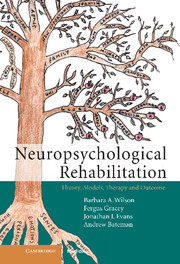Book contents
- Frontmatter
- Contents
- List of contributors
- Foreword by Keith Cicerone
- Preface
- Section 1 Background and theory
- Section 2 Group interventions
- Section 3 Case illustrations
- 13 Peter: successful rehabilitation following a severe head injury with cerebrovascular complications
- 14 Lorna: applying models of language, calculation and learning within holistic rehabilitation: from dysphasia and dyscalculia to independent cooking and travel
- 15 Caroline: treating post-traumatic stress disorder after traumatic brain injury
- 16 Interdisciplinary vocational rehabilitation addressing pain, fatigue, anxiety and impulsivity: Yusuf and his ‘new rules for business and life’
- 17 Judith: learning to do things ‘at the drop of a hat’: behavioural experiments to explore and change the ‘meaning’ in meaningful functional activity
- 18 Simon: brain injury and the family – the inclusion of children, family members and wider systems in the rehabilitation process
- 19 Adam: extending the therapeutic milieu into the community in the rehabilitation of a client with severe aphasia and apraxia
- 20 Malcolm: coping with the effects of Balint's syndrome and topographical disorientation
- 21 Kate: cognitive recovery and emotional adjustment in a young woman who was unresponsive for several months
- Section 4 Outcomes
- Index
- Plate section
18 - Simon: brain injury and the family – the inclusion of children, family members and wider systems in the rehabilitation process
from Section 3 - Case illustrations
Published online by Cambridge University Press: 03 March 2010
- Frontmatter
- Contents
- List of contributors
- Foreword by Keith Cicerone
- Preface
- Section 1 Background and theory
- Section 2 Group interventions
- Section 3 Case illustrations
- 13 Peter: successful rehabilitation following a severe head injury with cerebrovascular complications
- 14 Lorna: applying models of language, calculation and learning within holistic rehabilitation: from dysphasia and dyscalculia to independent cooking and travel
- 15 Caroline: treating post-traumatic stress disorder after traumatic brain injury
- 16 Interdisciplinary vocational rehabilitation addressing pain, fatigue, anxiety and impulsivity: Yusuf and his ‘new rules for business and life’
- 17 Judith: learning to do things ‘at the drop of a hat’: behavioural experiments to explore and change the ‘meaning’ in meaningful functional activity
- 18 Simon: brain injury and the family – the inclusion of children, family members and wider systems in the rehabilitation process
- 19 Adam: extending the therapeutic milieu into the community in the rehabilitation of a client with severe aphasia and apraxia
- 20 Malcolm: coping with the effects of Balint's syndrome and topographical disorientation
- 21 Kate: cognitive recovery and emotional adjustment in a young woman who was unresponsive for several months
- Section 4 Outcomes
- Index
- Plate section
Summary
Work with one client, Simon, and his family is described here in order to illustrate the importance of considering the individual in the context of his/her relationships, family systems and the wider systems of agencies involved in clients with brain injuries. This wider perspective supports rehabilitation in a number of ways. Consideration of these systemic factors, such as the impact of changes achieved in rehabilitation on family members (Perlesz et al., 1999; Laroi, 2003) and the involvement of, and interchange of information with, other agencies, is increasingly recognized as important to the achievement of rehabilitation goals. A client-centred approach is important in the development of a collaborative relationship both with the injured person and their family members (Sohlberg et al., 2001). Further, understanding the social and personal contexts of the person with the injury, including the influence of wider systems, is important in formulating and developing appropriate interventions (Wade, 2005). When significant others support the rehabilitation process, this reduces the likelihood of opting out (Oddy and Herbert, 2003).
Through the account of our work with Simon, we illustrate how understanding relational issues was crucial to the timing and types of intervention offered and ultimately in enabling Simon to work towards his goals relating to parenting. The chapter will summarize the presenting problems and results of the detailed assessment before offering a description and discussion of the approach taken toward this work, including a description of intervention.
- Type
- Chapter
- Information
- Neuropsychological RehabilitationTheory, Models, Therapy and Outcome, pp. 272 - 291Publisher: Cambridge University PressPrint publication year: 2009



